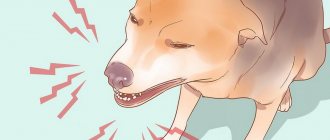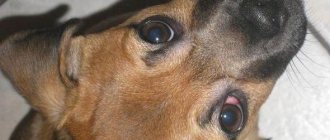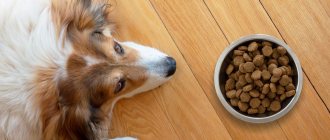First of all, you need to understand what kennel cough is. This highly contagious disease can be caused by a number of viral and bacterial agents, such as canine distemper, adenoviruses, herpesvirus, bordetella, parainfluenza, etc. It is better to take care of prevention in time than to waste time and effort on treating the disease. Therefore, it is recommended to vaccinate your dog promptly. Vaccines such as Eurican are also aimed at protecting against agents that can cause kennel cough (plague, adenoviruses).
Content
1. The main symptoms of kennel cough in dogs 2. General description of kennel cough 3. Diagnosis 4. Treatment of kennel cough in dogs 5. Prevention 6. Instead of a conclusion
Pulmonary infectious diseases of domestic animals often arise due to improper maintenance and lack of adequate nutrition. In the 1960s, it was noted that a specific paroxysmal cough in dogs, occurring in shelters and breeding kennels, quickly spread to all individuals, regardless of sex and age. As a result of a series of large-scale international studies, a number of strains of bacteria and viruses have been identified, collectively called “Kennel cough”. This is translated into Russian as “kennel cough.”
Infection occurs most often in places where pets gather, but it is also possible to get the disease through normal interaction with sick relatives. According to generally accepted stereotypes, stray dogs are carriers, but this is not the case. Kennel cough wanders throughout the territories of countries, sometimes manifesting itself in quite powerful outbreaks, measured in thousands of cases simultaneously. This illness is unpleasant, but with the right approach everything ends in complete recovery.
What is kennel cough?
Experts call contagious cough differently - adenovirus, canine influenza, bordetellosis, infectious tracheobronchitis. The disease got its name from aviary cough because of its contagiousness: if one dog in the kennel falls ill, the whole flock will soon follow his example. In fact, the pathogenesis is caused by the interaction of several pathogens, the main one of which is considered to be the bacterium Bordetella bronchiseptica. It is not transmitted to humans, but is related to the causative agent of whooping cough. Puppies, as well as older dogs with weakened immune systems, can become infected from stray relatives. Short-faced dogs are predisposed - pugs, Pekingese, bulldogs.
Main symptoms of kennel cough in dogs
Incubation of the disease varies greatly, depending on the pet's immunity. Usually this is from 2 to 28 days. Infection can only be detected by chance if you take a blood test during this period. The number of leukocytes will be extremely low, which is typical for all impending problems with the lungs and bronchi based on viral infection. And the visible cause will definitely be a cough. It practically does not stop, it seems that the animal is choking, sometimes it comes to vomiting. A lot of sputum is constantly coughed up, from which the sick dog tries to free itself.
Particularly severe and protracted manifestations are observed after nervous tension or physical exertion. When the dog greets its owner when it comes home, it wags its tail and then starts coughing until it vomits. Associated symptoms are possible in various combinations:
- Purulent and mucous discharge from the nose and eyes constantly or after sleep.
- Lymph nodes under the jaws increase greatly in size
- Body temperature can rise to +40.5C. You can measure it rectally or with a remote thermometer by pointing the mark at your nose.
- Breathing becomes jerky, there is no softness in the lungs, wheezing appears.
- The animal becomes lethargic, and after attacks tries to lie down.
- Against the background of kennel cough, physical exhaustion, numerous bronchial diseases develop, and fever occurs with pronounced tremors in the body.
There may also be individual symptoms that occur due to complications of chronic diseases or congenital health problems.
Symptoms
The following symptoms are characteristic of infectious tracheobronchitis:
- dry cough, as if the pet was choking on something;
- reflex vomiting;
- diarrhea;
- serous discharge from the nose, which gradually becomes mucous and dries out, forming crusts;
- conjunctivitis;
- tonsillitis, swallowing is painful, there is a threat of inflammation spreading to the lung tissue.
Sometimes the pet feels well, however, he is tormented by coughing attacks. If your dog has a collar, replace it with a harness during treatment to avoid irritating his throat. The cough continues for 10 days, after which the dog recovers or develops pneumonia.
General description of kennel cough
It is caused by bacteria and viruses; there is no single pathogen. These are aerobic gram-negative microorganisms that do not have spores. They reproduce on cilia in the trachea and bronchi. Of the viral types, it is worth highlighting adenoviruses of various types. They can cause various concomitant diseases, ranging from tracheitis to mild forms of hepatitis. This also includes microorganisms that cause pulmonary influenza. They can also be dangerous to humans.
Canine distemper is a common bacteria, especially in children under 1 year of age. The remaining strains are streptococci and staphylococci that have changed to aerobic forms. It is impossible to cure the manifestations of their activity without antibiotics, but it is first necessary to carry out tests for the presence of allergies.
Causes
As we said above, this is an infectious disease that is transmitted by the respiratory route. However, sometimes diagnosis and treatment can be complicated by the fact that the disease is caused by infections of viral and bacterial origin. If you notice the first signs, but there is a good 24-hour veterinary clinic nearby, then you should not waste time - go to the doctor and dispel your doubts.
This canine flu can be caused by a variety of pathogens. This could be microplasma, parainfluenza virus, various types of reovirus, herpes virus or adenovirus. Each of them has the ability to mutate and change, which also affects the course of the disease. Therefore, if your pet begins to show the first symptoms of the disease, then do not delay the matter. A good animal clinic can provide effective treatment and quickly get rid of the disease.
Establishing diagnosis
The veterinarian will rely on clinical signs, be sure to open the history of all vaccinations, and prescribe cellular and bacteriological tests in order to be safe from canine distemper. To do this, they take swabs and swabs from the mouth, pharynx, and sometimes even from the trachea in particularly difficult cases.
Diseases with similar symptoms, identified as a result of a comprehensive examination, can be complex parasites, pneumonia, traumatic closure of the trachea (usually from a blow to the throat or a bite in this area), heart failure. In addition to all the tests, you will need to undergo an X-ray examination, an ultrasound, an electrocardiogram and an echogram. Therefore, self-diagnosis at home is impossible.
Vaccinate your dog
Discuss this issue with your veterinarian. Not all dogs need to be vaccinated with specific kennel cough vaccines because not all dogs are at risk of contracting the disease. Dogs that come into contact with other dogs (in kennels, dog clubs, pet hotels, etc.) are at higher risk of infection. In any case, dogs should be vaccinated against major infections. The Eurikan DHPPi2-L vaccine is aimed at protecting against kennel cough caused by parainfluenza, infectious laryngotracheitis or plague.
Eurikan DHPPi2-L is suitable for vaccination of dogs of any breed and kept in any conditions, aimed at protecting against distemper, parvovirus enteritis, leptospirosis, rabies, parainfluenza, infectious laryngotracheitis and plague.
Remember: no vaccine is 100% protective, but a vaccinated dog will usually have significantly milder symptoms and be less infectious to other dogs.
For comprehensive protection, dogs are not only vaccinated, but also treated against parasites. Are you already familiar with the ability to protect your dog from ticks and fleas using the Frontline NexgarD tablet?
Treatment of kennel cough in dogs
It is strictly forbidden to use folk remedies. Also in old veterinary reference books you can find a statement that this disease can go away on its own, depending on the animal’s immunity. There is no point in experimenting, because the number of viruses is growing every year, and it is not known what triggered the symptoms.
The dog must be completely fenced during periods of physical activity. You should only give warm water up to 40 degrees to drink. The doctor prescribes medications against viruses, bacteria, immune modulators, as well as general therapy according to the identified symptoms.
If there is no improvement within 5 days, then the diagnosis can be revised after ultrasound and x-ray examination. Lethal outcome occurs, but in individuals in extreme states of exhaustion. Without following the regimen prescribed by the veterinarian, recovery can take up to 1 month. It is necessary to protect the animal from drafts, not to bathe it, and to provide a warm place where the dog can sleep and gain strength. If you have a fever, it is advisable to cover your pet with a woolen blanket.
Diagnostics
Clinical symptoms are taken into account and anamnesis is collected. During the examination, the veterinarian performs thermometry and listens to the heart to exclude or confirm cardiac cough. When the heart is normal, the veterinarian will prescribe medication to treat kennel cough. If you treated your pet for 5-7 days and did not notice any improvement, your dog has a more serious illness. It is necessary to go to the clinic again and conduct expensive laboratory and instrumental tests to identify the pathogen. The veterinarian will interpret the test results and adjust the treatment.
Watch the video:
Prevention
It is much easier to prevent this disease, because treatment is very difficult. A sick animal must be isolated, because transmission occurs through airborne droplets. Not all owners understand this, so at the slightest suspicion, it is better to unite on joint walks. Even if there are no external manifestations, the pet is a carrier of bacteria for 10 days, and its breath is contagious to surrounding relatives. You need to walk alone, without joining other acquaintances, otherwise this cough will manifest itself endlessly within your group. You also need to avoid physical activity during this period so as not to weaken the body.
The owner must maintain sufficient humidity in the room, about 45-50%, to ensure proper breathing. All bowls, toys, leashes, as well as the apartment as a whole, must be regularly disinfected. If the owner is sick, close contact with the pet should be avoided, because human viruses can also spread to animals.
Vaccines can be used against influenza viruses. These pathogens account for approximately half of all cases of respiratory problems.
Treatment
The veterinarian decides how to treat enclosure cough, based on the animal’s well-being and the degree of development of the disease. It is necessary to take action as early as possible to avoid severe pathology and the development of complications.
If the dog has a strong immune system, the infection will subside without drugs, but with appropriate care. If after a week the patient’s health does not improve and the kennel cough is still bothersome, drug therapy is required.
Treatment of kennel cough in a pet is mandatory, otherwise the pathology may develop into a chronic form.
Home mode
Treating your pet at home is easy. The owner is required to isolate the sick pet from other animals and provide competent care. It consists of the following actions:
- free your pet from physical activity, rest and bed rest are recommended;
- It is forbidden to go outside or take walks. Canine adenovirus is highly contagious, and cool weather will only make the cough worse;
- Give plenty of fluids to avoid dehydration. It is recommended to drink warm boiled water;
- ventilate the room at least twice an hour;
- During illness, medicinal food is administered;
- serve food in small portions, do not stuff food in the absence of appetite. If your dog has completely lost the desire to eat, warm milk or chicken broth will help give him strength.
To alleviate the symptoms of kennel cough in dogs, add a spoonful of honey to a glass of drink. This bee product coats mucous membranes and destroys bacterial microorganisms. If a four-legged patient does not have problems with sugar, this remedy is given three times a day.
It will be useful to hold your pet over steam. You need to turn on hot water in the bathroom, add chamomile or St. John's wort, and bring the animal indoors for 10 minutes. Such inhalations relieve swelling of the mucous membranes, prevent the inflammatory process, thin the mucus, and reduce the intensity of the reflex.
Medication
If treatment at home does not bring the desired results or dog adenovirus is severe, it is necessary to use medications. The veterinarian prescribes a complex therapy that fights not only the symptoms, but also the cause of the disease. Treatment includes taking the following medications:
- Antibiotics. Prescribed if adenovirus in dogs is accompanied by bacterial lesions of the upper and lower respiratory tract. Prescribed in extreme cases, when the high temperature lasts more than three days. Broad-spectrum agents, for example, the tetracycline group, are suitable. In order for the medicine to reach the bronchi, it is administered intramuscularly. To normalize the functioning of the gastrointestinal tract after taking antibacterial drugs, probiotics and prebiotics are prescribed.
- Cough remedies. Designed to dilute mucus accumulated in the bronchi. Relieve dry cough and make it productive. When taken regularly, the lungs are cleared of infected mucus and pus, and breathing improves. If the reflex is accompanied by secretions, the drug is recommended only for severe and frequent coughing, due to which the animal cannot rest or sleep.
- Immunomodulators . They help to quickly cope with the disease, restore protective functions, have a general strengthening effect, and prevent the possibility of relapses in the future.
It is prohibited to treat infections in dogs with medications on your own, without consulting a doctor. If the regimen prescribed by the veterinarian does not bring a positive result, the tests should be repeated. There is a possibility of an incorrect diagnosis.
A cough similar to an adenovirus in dogs can be a consequence of other pathologies. Similar symptoms occur with parvovirus infection or bordetellosis.











